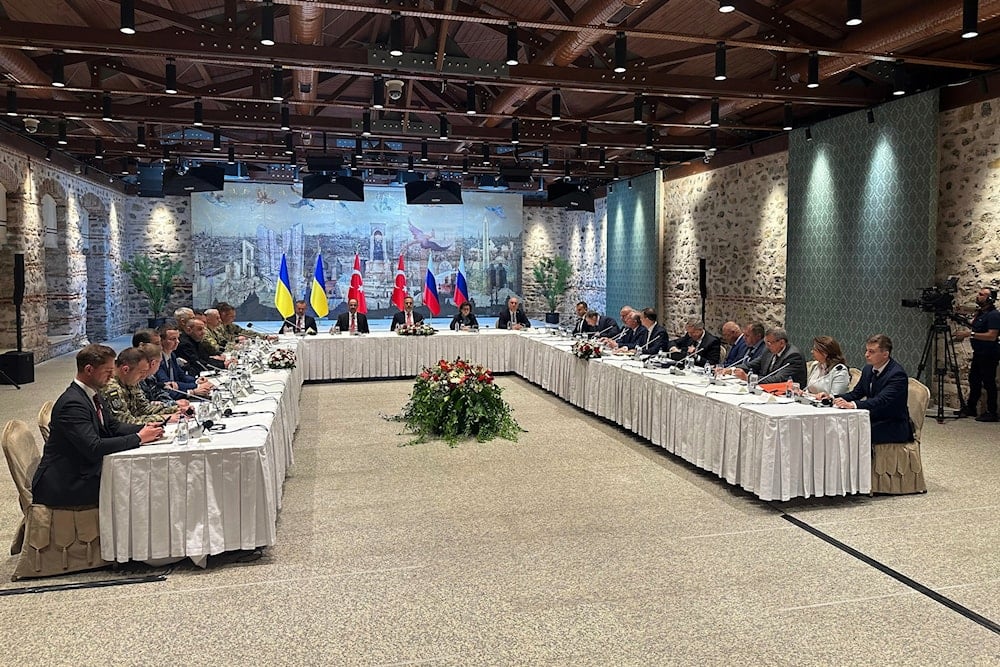Russia outlines ceasefire conditions in Istanbul talks with Ukraine
Among the conditions are neutrality status, recognition of territorial claims, and guarantees for Russian-speaking citizens.
-

This handout photograph taken and released by the Ukrainian Foreign Ministry on May 16, 2025, shows members of the Ukrainian (L) and Russian (R) delegations attending a meeting at the Turkish Presidential office Dolmabahce, in Istanbul (Handout by UKRAINIAN FOREIGN MINISTRY / AFP)
The Russian Ministry of Defense has revealed the conditions presented by Moscow during the Istanbul negotiations with Kiev, as shared by the Clash Report platform on social media.
The outlined terms reflect Russia’s position on a potential settlement in Ukraine, with an immediate ceasefire as the primary demand.
Russia's ceasefire conditions
Neutrality modeled on Austria
The first condition proposed by Moscow is that Ukraine adopt a neutral status, similar to Austria’s model. This would prohibit the presence of foreign troops or non-Ukrainian military bases on Ukrainian territory, effectively excluding NATO or other military alliances from operating within the country.
No foreign troops or bases in Ukraine
Moscow emphasized that neutrality must be comprehensive, with Kiev legally committing to reject the stationing of foreign forces and equipment.
Territorial demands and border recognition
Among the key demands, Russia requires Ukraine to formally recognize its constitutional claims over five regions: Donetsk, Lugansk, Kherson, Zaporizhzhia, and the Crimean Peninsula.
The Russian Defense Ministry stressed that the immediate ceasefire is contingent upon the complete withdrawal of Ukrainian forces from all five regions claimed by Russia.
Renunciation of war compensation claims
Moscow is also seeking a mutual legal renunciation of any compensation claims related to war losses, including economic damage and human casualties.
Protection of Russian-speaking citizens
Russia demands that Ukraine commit to European standards on minority rights, specifically to safeguard the rights of Russian-speaking citizens. In addition, Moscow calls for an end to what it terms “nationalist propaganda” within Ukrainian society.
Russia, Ukraine agreed to exchange ceasefire conditions
Later on Saturday, Kremlin spokesman Dmitry Peskov said Russia and Ukraine have agreed to exchange the lists of ceasefire conditions, noting that the Russian side is working on the matter.
The Russian side has prepared such a list and will hand it over, with exchange with the Ukrainian side," he told reporters.
At the same time, the work on the resolution of the conflict in Ukraine has just started and it will be continued, he added.
Change in Russian delegation to negotiations not being discussed
Peskov pointed out that a change in the composition of the Russian delegation to the negotiations with Ukraine is not being discussed, emphasizing the importance of implementing the agreements reached during the recent Russia-Ukraine talks in Istanbul.
The Kremlin spokesperson also asserted that the ongoing negotiations "are and should be held in a closed format."
Putin-Zelensky meeting possible if certain agreements reached
The Russian diplomat highlighted that a meeting between Russian President Vladimir Putin and his Ukrainian counterpart Volodymyr Zelensky is possible if delegations of both countries reach certain agreements.
"Such a meeting as a result of the work of the delegations of the two sides is possible when certain agreements of these delegations are reached," he said.
Elsewhere, Peskov also said that Moscow considers the candidacy of Kiev's signatory as the main and fundamental thing when signing documents between the Russian and Ukrainian delegations during the negotiations.
First direct talks since 2022
Russia and Ukraine held their first direct peace talks in over three years on Friday in Istanbul, reaching a key agreement on a large-scale prisoner exchange but making little headway on a ceasefire or broader political settlement.
The 90-minute meeting marked the first direct diplomatic engagement between Moscow and Kiev since 2022 and came amid continued hostilities and mounting international calls for a de-escalation of the conflict.
Both sides emerged from the session expressing cautious openness to further dialogue, though no immediate breakthrough was achieved on halting the war, now in its third year.
Ukraine entered the talks seeking an unconditional ceasefire, hoping to bring relief to areas devastated by the conflict and to ease the humanitarian crisis affecting millions.
Russia, however, dismissed the demand, and both sides instead agreed to present their respective “visions” for a potential ceasefire at a later stage, according to Russian lead negotiator Vladimir Medinsky.
Prisoner exchange agreement reached
The only concrete outcome of the talks was an agreement to exchange 1,000 prisoners from each side. Both delegations hailed the deal as a positive humanitarian step.
Ukrainian Defense Minister and chief negotiator Rustem Umerov described the agreement as a “great result”, noting that it set the stage for further negotiations.
Ukraine pushes for Putin-Zelensky summit
Kiev pushed for a direct meeting between Ukrainian President Volodymyr Zelensky and Russian President Vladimir Putin. Ukraine’s Foreign Ministry spokesperson Georgiy Tykhy stressed that progress would require “a meeting of leaders.”
Russia acknowledged Ukraine’s request for a summit but did not commit. Putin declined to attend the talks in Turkey, instead dispatching a lower-level delegation. Zelensky accused Putin of being “afraid” to engage directly and said Moscow was not approaching the talks “seriously”.
Rubio urges 'peaceful end to the war'
Ahead of the negotiations, Ukrainian representatives met with US Secretary of State Marco Rubio, Trump’s special envoy Keith Kellogg, and national security advisors from Britain, France, and Germany.
State Department spokesperson Tammy Bruce said Rubio had urged “a peaceful end to the war” and emphasized that “the killing needs to stop.”
Speaking at a European summit in Albania, Zelensky called on the international community to impose further sanctions on Russia if the talks failed to yield results, warning of global consequences should diplomatic efforts collapse.
Read more: Trump, Putin may soon finalize Ukraine peace agreement

 5 Min Read
5 Min Read









